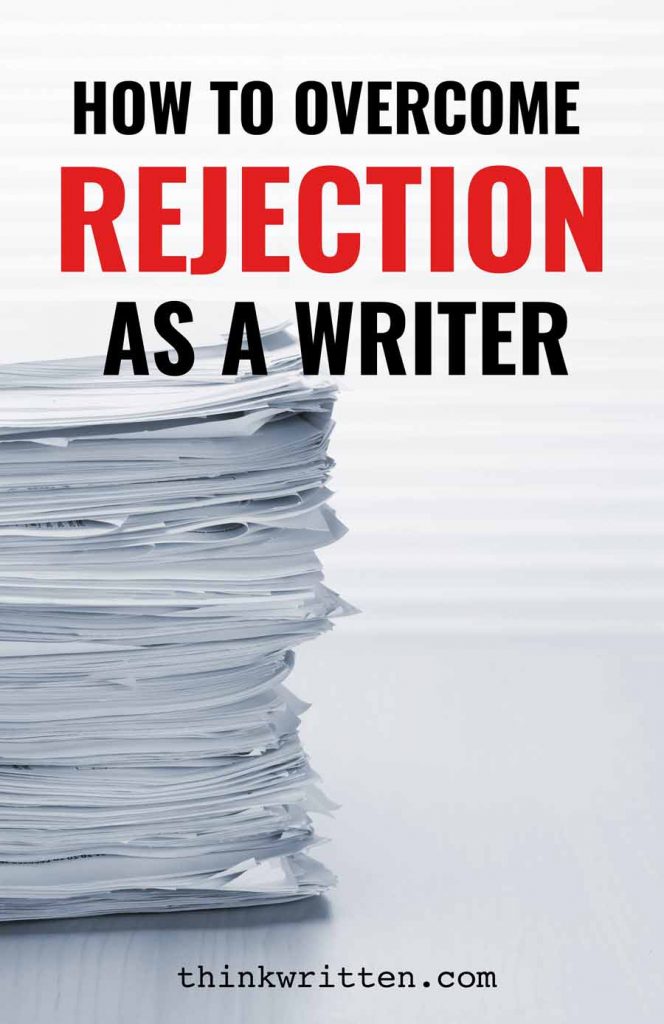We may receive a commission when you make a purchase from one of our links for products and services we recommend. As an Amazon Associate we earn from qualifying purchases. Thank you for support!
Experiencing rejection as a writer can be a disheartening process. Today’s post focuses on how to overcome rejection as a writer so you can finally reach your writing and publishing goals.

It is going to happen. You put your heart and soul into your work. You hone your craft and polish your manuscript until you can see your face reflected in every paragraph. You’ve done your research and found the best publication to match your style. You’re done. You’re ready. You mail in your manuscript – electronic or otherwise – and wait with bated breath for the response.
And then it happens: The rejection notice.
“We’re not taking new authors”
“Just not for us right now.”
It is going to happen eventually, and it is going to hurt. But how do you overcome rejection as a writer and keep it from stopping you in your tracks?

You Are Not Alone: Remember Rejection Happens to Every Writer
In his memoir, On Writing, Stephen King relays the sobering story of his first attempt at publishing. He received a rejection notice – a form letter from Alfred Hitchcock’s mystery magazine with a single handwritten note regarding his decision to staple the manuscript instead of using a paperclip.
Not a particularly helpful piece of advice, but one he followed from then on. He didn’t wallow in self-pity, though. He didn’t stop. He knew that writing was what he wanted to do, what he was meant to do.
If this is something you are meant to do (and that is something you must decide, not discover), then you have to accept rejection as part of the process.
This is just as true for academic and non-fiction writers as it is for those of us in the fiction business. Not everyone is going to get that same zing from your work, and that is okay.
See it as a Learning Experience

Sometimes (not often, if you believe a lot of writers) rejection comes with a lesson – something you did or didn’t do that made your work not stand out (or stand out in a wrong way) to the publisher.
If this is something mechanical (missing edits or structural issues with the story) put this feedback to use and polish your story (no one said you had to stop editing your work after you submitted it for review!).
You may also find that you had an incorrect perception of the publisher’s brand, in which case you may want to switch potential publishers with which to market your manuscript, or change direction with your story to better fit the expectation.
It’s okay to cry

No, really, it is okay to cry. You are going to have emotions about this, especially when it’s the first rejection after carefully submitting your manuscript.
Sometimes you grow numb to it after a while or after you’ve had enough successes under your belt to counterbalance the loses. But ultimately, you are going to feel something when this happens, and you need to recognize that that is okay, too.
Feel sad about it for a moment, but only for a moment. If you let rejection possess you, it is all you will ever know. Remember – this is a journey, and rejection is going to be part of it, but it isn’t all of it; not by a long shot.
It’s okay to not do anything
If you are like me, you need a gilded invitation signed by the Pope to stop working on something for five minutes. And when stressed, my go-to activity is work. Cleaning, writing, yard work, and so on. Anything, really, to keep my brain busy and my hands occupied and my thoughts not on the thing that set me off in the first place.
Of course, nothing triggers stress like not thinking you’re good enough, but it’s important to remember that you are not defined totally by what you do or what you are doing.
A writer writes – yes, this is true. But sometimes you need to step away from your work and take a brief hiatus. This isn’t quitting or giving in to discouragement. This is self-care. My 9-to-5 job is great – not because the work is easy, but because our leadership works as a support structure and encourages (especially now) employees to take time for themselves to decompress and recharge.
You are your own boss when it comes to your writing, so give yourself a break and step away from the pen for a spell.
Remember why you love writing by reading

A writer also reads, always. So, while you’re taking your break, read something to make you happy. Doesn’t matter if it is within or totally outside of your genre, and it should NOT be a technical work about writing.
(Memoirs of other writers with inspirational messages for budding writers are the exception to this – the ONLY exception. Read Mary Karr and you’re okay, but I will hunt you down if you spend your downtime reading Hero with a Thousand Faces.) I personally like to go to a book that I have already read a few times and dogeared the pages half to death – like Umberto Ecco’s Foucault’s Pendulum or Richard Lee Byers’s The Dead God trilogy or even collections of short stories – like little potato chips, it’s hard to stop with just one.
Consider Self Publishing

If you have taken a few attempts at publishing a work, traditional avenues might not be your best bet. Self-publishing can be a way to get your stories out there without worrying about someone else’s opinion of your work’s worth.
This is especially easy nowadays with Amazon Kindle’s Direct Publishing and Barnes & Noble Press tools that allow you to publish in print as well as eBook formats.
Getting started takes no time and (as of the writing of this article) you keep up to a 70% royalty on all of your sales. And these are only two of the options out there, most of which let you keep your print rights (so if your self-published work gets attention on its own, a publisher with bigger distribution channels can pick you up).
If publishing a book isn’t your thing, consider starting your own blog. The “how” of getting your words into the world doesn’t need to be something grand and extravagant.
Sometimes, settling for a smaller venue is better. Short stories (especially flash fiction) and serially published works are made for online publishing. And if you are good and can draw a small audience, you can use services like Patreon to collect the funds you need to further your venture.
There are many things you can blog about as a writer, and mostly your author blog is a great place to dump your thoughts and create a space tailored to your image and brand as a writer.
Remember – It’s a Marathon, Not a Sprint
Laura Ingalls Wilder was 60 when she had her first publishing success. Raymond Chandler didn’t publish his first novel until age 44. The Marquis de Sade didn’t publish Justine until he was 51 (of course, he was in the Bastille for 4 years while writing it, so maybe skip that part).
Not everyone starts at the same time, and not everyone comes into success early. Perseverance will pay dividends, is what I am trying to say. And if you love writing as much as I do, it doesn’t matter if it takes a day or a century, you’ll keep at it until you get where you want to be.
Do you have any tips for how to conquer rejection as a writer? Share your thoughts on how to overcome rejection as a writer in the comments section below!
